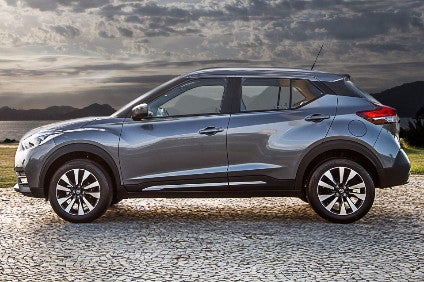
Nissan has really needed something different to boost its sales in Brazil where it both imports or manufactures locally the vehicles it sells.
The brand is one of the sponsors of Rio de Janeiro Olympics 2016 and the Kicks is the official car. The automaker will start selling it here on 5 August and plans to import at least 3,000 units a month from Mexico [which has a free trade agreement with Brazil including, with some restrictions, vehicles – ed].

Discover B2B Marketing That Performs
Combine business intelligence and editorial excellence to reach engaged professionals across 36 leading media platforms.
Local production is due to start early in 2017. Nissan Brazil's Resende manufacturing plant, 160km/100miles west of Rio de Janeiro City, is still operating only one shift since opening a little over two years ago, its production restricted to March [Micra] and Versa. A second shift will start by the end of this year, adding 600 new workers to the current 2,000.
Once local production starts, the Brazilian plant will export the Kicks to South America while Nissan Mexico will supply North America.
Nissan Brazil's bet on the compact SUV segment, which has expanded from 2% to 10% of the market in five years, has come as the right product at the right time. Like the earlier, Juke, its striking design draws looks from everyone.
Some might think the roofline, slightly dropped at the rear, the and shape of the C-pillar pillar reminiscent of the (now locally assembled) Range Rover Evoque. The tailgate is contoured to follow the outline of the boomerang-shaped tail lights.
Architecture is shared with the Brazilian made Versa while the 2.61m/102.7 inch wheelbase (1cm/0.4 inch more than the Versa) matches Honda's HR-V, also made locally in Brazil (and in neighbouring Argentina). The Kicks is the same overall length as the Honda crossover while width and height also very close so there's no doubt which is Nissan's main target.
The Kicks interior is more daring and modern than the conservative Honda's. The digital instrument cluster is a segment exclusive and the top SL version (the only variant on sale initially) has a leather-upholstered fascia though large, hard plastic surfaces are still found.
Electronic driver aids include Nissan's clever vision 360° system that uses four cameras to give a 'surround' view on the central display screen yet the model retains a rear obstacle sensor. There is ample rear seat knee and headroom, two front and four side airbags plus a usefully sized and shaped 432-litre/15.2 cubic feet boot.
The 1.6-litre/97.6 cubic inch engine from the March/Versa lines pumps out 112.4bhp and 112.1 lb-ft on either ethanol or petrol. Thanks to the 1,142kg/2,517lb kerb weight, the Kicks is lively enough though performance is not its highlight. The CVT gearbox (a type of transmission long much loved by Nissan and similar to the HR-V auto) is a bit lazy shifting through its 'virtual gears'.
Front seats offer above average comfort and the turning radius of just 10.2 m/33.5 ft makes manoeuvring easy. Missing, but available on rivals, are an electronic parking brake and cruise control.
This fully-trimmed version retails in Brazil for BRL89,990/US$27,000, about 10% cheaper than the top HR-V.
The battle with Honda will be interesting.






